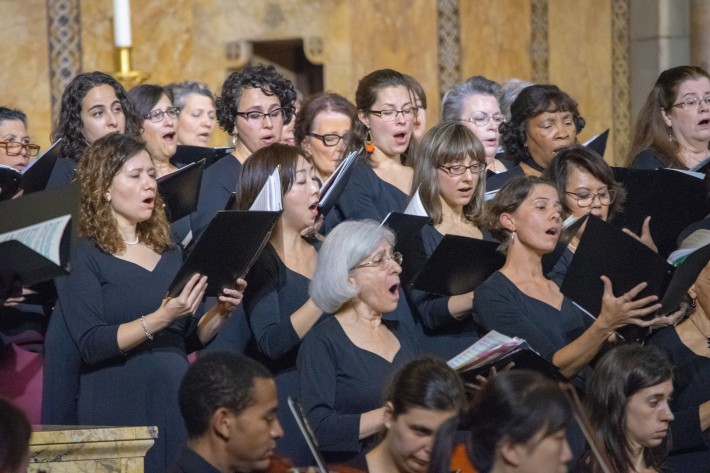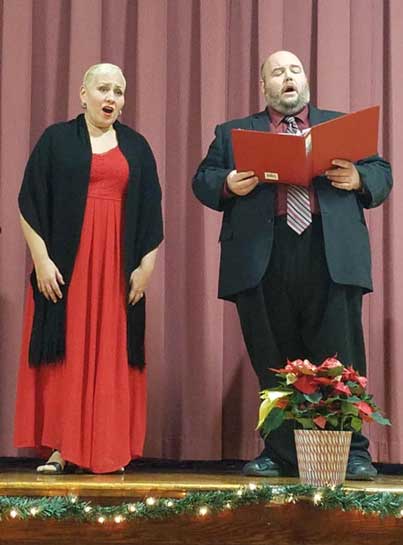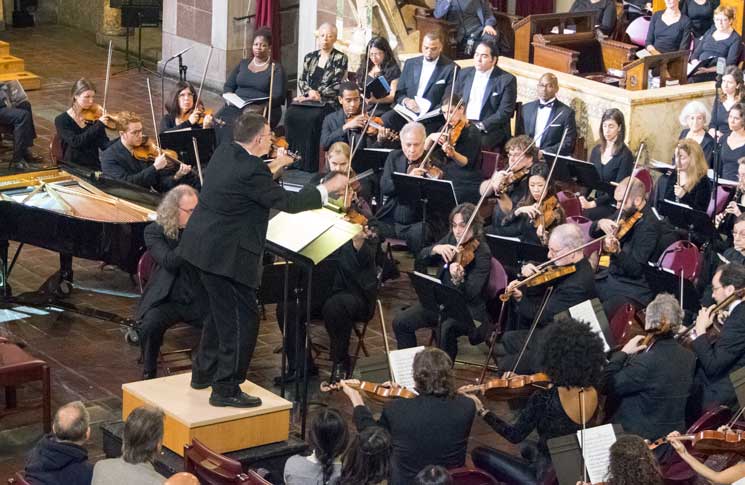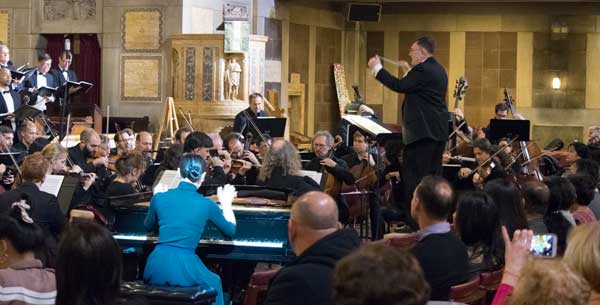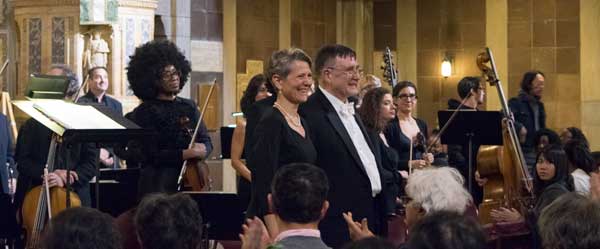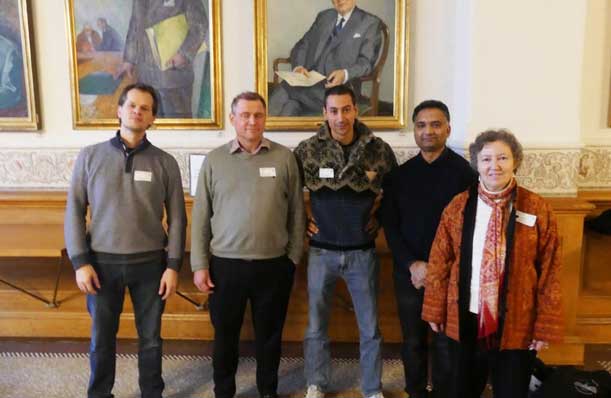by Dennis Speed
When the G-20 meeting opens in Buenos Aires on November 30, will Ludwig van Beethoven’s Fantasia for Piano, Orchestra and Chorus, Op. 80, be the piece chosen for the opening ceremony? It would be well recommended. That piece was the center of the Schiller Institute’s Friedrich Schiller Birthday Celebration Concert, held in New York City on Sunday, November 18.
The Fantasia, Beethoven’s earlier study for what he would later compose as the Ninth Symphony, also referred to as the “Choral” Symphony, would prompt a far different, far more productive political deliberation at that upcoming conference—involving Presidents Putin, Trump and Xi Jinping, among others—than was sadly witnessed at the Nov. 11 Paris Summit. In Paris, despite the gravity and importance of the occasion—the commemoration of the end of World War I, a conflict resulting in 40 million deaths and casualties, followed by another 50 million deaths in the ensuing Great Flu Epidemic of 1918-1920—the pre-pubescent snit of the erstwhile host, President Emmanuel “Micron” Macron, prevented any war-avoidance discussions from taking place.
Dennis Speed, speaking on behalf of the Schiller Institute at the beginning of the Schiller Birthday Celebration Concert, began:
Ludwig van Beethoven once made the statement: “If people understood my music better, there would be no war.” Confucius is sometimes quoted to the same effect. He stated, “When music and courtesy are better understood and appreciated, there will be no war.” One week ago today, an opportunity to commit humanity to a new vision of a world without war was lost. The gathering last week in Paris, on the 100th anniversary of the end of World War I, bringing together 60 heads of state, failed to focus humanity on the common aims of mankind, as it might have. Friedrich Schiller’s famous comment regarding the French Revolution, that a great moment has found a little people, need not have been applicable to that occasion. [And] It need not be applicable to this moment, or any future moment in time. Man, as Schiller tells us, is greater than his destiny.
Speed also referred to a passage in The Federalist, No. 1, written by Alexander Hamilton. After the American Revolution successfully challenged and beat the British Empire, Hamilton wrote, in The Federalist, No. 1:
It has been frequently remarked that it seems to have been reserved to the people of this country, by their conduct and example, to decide the important question, whether societies of men are really capable or not of establishing good government from reflection and choice, or whether they are forever destined to depend for their political constitutions on accident and force. If there be any truth in the remark, the crisis at which we are arrived may with propriety be regarded as the era in which that decision is to be made; and a wrong election of the part we shall act may, in this view, deserve to be considered as the general misfortune of mankind.
The New York Concert
Many comments received from the more than 400-person audience and the 160-strong orchestra and chorus indicate that the process of dialogue about the nature and function of great ideas in a time of crisis, conveyed through great drama and music, has taken a significant step forward among those continuously involved in this enterprise in recent months.
While political partisanship has made serious discussion in New York City very difficult, the highly diverse audience that assembled at St. Bartholomew’s Church to hear African-American Spirituals, Johannes Brahms’ “Dem dunkeln Schoss,” and the Beethoven Mass in C Major, op. 86 and Choral Fantasia, op. 80, were able collectively to listen to the results—as composed by Beethoven—of a 70-year dialogue involving J.S. Bach, Handel, Haydn, Mozart and Beethoven, about the nature and future of not only music, but the nature and future of mankind. It was this “musical masters in dialogue” principle, including Schiller as part of that dialogue, that was presented as the model for what might be recommended, if not replicated as the standard of discourse required in this most divisive time in our nation.

One observation, communicated by an audience member the following day, usefully characterized, not merely the recent concerts performed by the Schiller Institute New York City Chorus, but the three-year long succession of such performances given, more than fifteen in all, throughout the city:
One aspect of … something which has now become characteristic of these NY concerts … is, presenting in a manner that catches the audience off-guard. From the [June 2017 Schiller Chorus performance at the Foundation for the Revival of Classical Culture-sponsored] Carnegie Hall concert, begun with a singer singing her way slowly across the stage, to last night’s provocative opening presentation followed by the quiet entrance of the pianist who simply began playing, a variety of such surprises, sometimes leaving the audience wondering whether or not it should applaud, and rather preferring not to, have been well employed.
Readings from Friedrich Schiller’s works, recited by actor Dikran Tulaine, were interspersed with the musical selections throughout. The program began with Schiller, followed by Bach, then two Spirituals—each separated by the words of Schiller and William Shakespeare, then Brahms’ “Dem dunkeln Schoss der Heil’gen Erde,” and the Choral Fantasia, also preceded by a reading from Schiller. Following the intermission, the entire Beethoven Mass in C Major, prefaced by Schiller, was performed. As always, the Schiller Institute performed at the Verdi tuning of C=256 cycles, the proper tuning for Classical composition, sometimes erroneously characterized as “lower” tuning.
Remembering Maestro Morss
Importantly, the concert was dedicated to the memory of Maestro Anthony Morss, who had worked with the Schiller institute for thirty years, before his death in August of this year. Morss, who had served as the Music Director for the New York State Opera Company, the Verismo Opera, the Eastern Opera Theater of New York, the Lubo Opera Company of New Jersey and other companies, was one of the earliest proponents of returning to the Verdi tuning. In 1990 he conducted a concert performance of the Beethoven opera Fidelio at Lincoln Center’s Alice Tully Hall, which definitively proved that the modern opera orchestra could accommodate the proper tuning.
Morss spoke at many Schiller Institute events, and in the 1990s was a vocal defender of the then-incarcerated Lyndon LaRouche, whose writings, particularly LaRouche’s musical writings, Morss closely read. Maestro Morss’ weekly presence at the Schiller Institute choral rehearsals was an essential component of giving the chorus the confidence that an amateur grouping could aspire to, and achieve, the highest standards of musical performance. Conductor John Sigerson’s tribute to Morss at the concert is presented below.
The performance of the Choral Fantasia was a first for the Schiller Institute in the United States. While associates of LaRouche had performed the piece in Detroit in December of 1979, a return to presentation of the piece, one of the best possible introductions to the Ninth Symphony, had only recently become possible. Beethoven himself conducted the piece in its premiere on December 22, 1808, at a fundraising concert that he had organized for himself. Other pieces first performed at the same concert were the Fourth Piano Concerto, Fifth and Sixth Symphonies, and sections of the Mass in C Major. Beethoven saved the Fantasia for the concert’s end and improvised the entire piano opening to the piece on the spot. Its final words, “Only when Love and Power are wed / Does Man deserve God’s favor” resonated deeply with the audience, both then, and now.
Several attendees, in messages sent to the Schiller Institute the day after the concert, remarked on the “pin-drop quiet” concentration in the audience throughout the entire first part of the concert. One person commented:

Piano soloist MyHoa Steger during Beethoven’s Choral Fantasia.
The highlights in the music were [the Spiritual,] “Anyhow,” and the Choral Fantasia … [Pianist My-Hoa Steger] “aced” it. The difference in the orchestra was clear. You could turn off the sound, and just watch them, and tell it was a great performance … The Bach [played by pianist Yuting Zhou] was very well done. The prelude contains the chromatic scale used in the 3-year-later Musical Offering. The fugue features the diminished 7th leap of the same King’s theme. The fugue subject is similar to Handel’s “And with his Stripes” and “Kyrie” from Mozart’s Requiem…
And this short message gives another window into the effect of the performance:
Even though we had to slip out between acts (my daughter and I came straight to the concert from a film shoot that ran long, and we very much needed to feed her!)—we all felt so uplifted by both the beautiful music and the uncanny timeliness of Schiller’s poetry.
It was also so moving to witness a volunteer chorus—to think that so much talent lies in so many people in this town, who one likely passes by on the street, in the subway, etc. without knowing. ….. It was astonishing…. last evening’s beautiful show has shifted my perception in ways I am still very much processing.
Bringing Schiller to Americans
Those that have followed the evolution of the Schiller Institute New York City Chorus since it was founded (following the death by strangulation of New Yorker Eric Garner in 2014), or have been part of the chorus’ growth from its first December 20, 2014 performance of excerpts of G.W.F. Handel’s Messiah, know that there are hundreds of people, almost all of them non-professionals, who have been involved in the subsequent performances. Some of the coordinators of the chorus, however, remarked that there seemed to be a greater depth of seriousness in the group than before.
In part, this may have been due to an insistence, beginning five weeks before the concert, that choral members must get to know the up-to-then unstudied Schiller. So, readings of Schiller’s poetry and a few of his prose pieces were organized. Additionally, some of New York’s many cultural organizations became excited to know that a Schiller celebration was occurring, and that the idea of promoting the generalized reading of Classical literature as a way of rejuvenating competent language-usage in general, was being advanced. The idea that an enthusiastic, voluntary return to literacy could be promoted through a fifteen-hundred-person citywide chorus, captured their imagination.
This approach seemed to provoke particularly “deep thinking” on the question of aesthetical education from younger persons in attendance.
One young student wrote:
[ 1 ] ( Zhi Hui) refers to “wisdom” in Chinese. But the two characters each have different meanings. [ 2 ] is intelligence, while [ 3 ] means wise. It’s easy to get [ 4 ]. Everybody at my school has it. But not everyone has [ 5 ]. It’s like a seed buried in one’s heart since we are born, and needs to be inspired and discovered, as we grow up. We call it [ 6 ] (Hui Gen). [ 7 ] means root, but it’s also reasonable to interpret it as seed, because they each have roots deep in each person’s mind, and they sprout when they feel like it. Some people have [ 8 ], some do not; some [ 9 ] can bloom, some do not.
Actually, the word [ 10 ] is a Buddhist word, but it has been adopted into Chinese language and has become an important part of us. To better interpret this word, one can read a small story about the difference between people with it and those without it. The story is in the “Succession of Sixth Patriarch.”
This thinking is reminiscent of considerations concerning the differences between thought and language, and the power of the ironic juxtaposition of thought to text, of notes to music, and the higher unity of poetry and music that was required for Beethoven, or any composer, to usefully add anything to the poetry of Schiller. Brahms’ “Dem dunkeln Schoss” uses eight lines taken from Schiller’s “Song of the Bell,” but in an apparently completely different way than they are used in the broader context of that poem, in order to commemorate the death of his great friend, Robert Schumann. In this way, Brahms demonstrates that, while no poem is ever able to actually be translated into another language, no great poem is ever limited to a single meaning.
It is also possible to take a section of a poem, find the music contained within it, and voice that music in the service of purposes not anticipated by the poet, but yet in full accordance with the substance of the Idea for which the poem’s words are but a shadow-echo.
The conceptual resonance of the chorus was notable in the complete Beethoven Mass in C Major, a piece infrequently performed, which is, however, an essential work for understanding his spiritual development. One listener remarked:
From a purely musical point of view I found the performance to be astounding. There are simply no words to describe the feelings that I had regarding Beethoven’s music. The interpretation was flawless, although a bit on the scholarly and spiritual/religious side. The last most likely being influenced by the spirituality of Schiller’s work.
Indeed.
As has happened before in the Schiller Institute Chorus performances of this piece, the last section, the Agnus Dei’s “Dona nobis pacem” brought together all that had been presented through the entirety of the program. Soloists Indira Mahajan, Linda Childs, Everett Suttle, and Costas Tsourakis received many compliments from the audience, many of whom have seen them perform at other of the Schiller concerts, or in other musical programs around the city.

Schiller Institute Chorus Directors Diane Sare and John Sigerson, post concert.
The conductors, John Sigerson and Diane Sare, have succeeded in creating a core ensemble of 70-80 singers, all of whom are increasingly clear that the mission of the chorus is to destroy the idea of “entertainment” as the primary focus of art. It is the re-creation of the intent of the composer, as conveyed through the medium of Chorus, which is the mission of the chorus. Re-creation of great ideas, whether in scientific or in artistic experiment, not entertainment, is the cultural backbone, the heartbeat, of social change in our time. Their participation in these artistic experiments qualifies the members of the chorus to “lift ev’ry voice” of deliberation on all things, including the immediate direction of this country as a force for good in history, to the world-historical stage, rather than petty gossip.
It is the aesthetical education of the population and its Presidential process that is the indispensable mission which the Schiller Institute has taken another important step forward in performing. That is not the pursuit of entertainment, but, rather, the pursuit of Happiness, as the Founders would have understood that principle.
A Schiller Institute version of the concert is under production and will be available soon. Other coverage of the concert can be found here.










